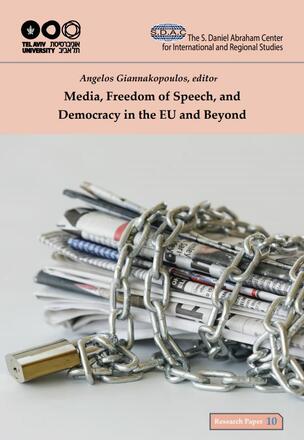Publication Date:
May 2019
Research and Editorial Team:
Angelos Giannakopoulos (editor)

This book, divided into 10 chapters written by different authors, presents the most recent developments in the European media sphere through relevant case studies, highlighting the worrying trend of independent media and democratic culture in Europe.
- “Media, Freedom of Speech, and Democracy: Journalists under pressure in Europe” - Renate Schroeder: this text addresses the most concerning trends in European journalism, such as physical attacks, impunity, and self-censorship. Also, it stresses the failure of member states in implementing EU guidelines to foster independent journalism.
- “Hungary: A Country on the Path towards an Authoritarian Media System” - Attila Batorfy: this chapter focuses on the transformation of the Hungarian media system perpetrated by the Orbán government through arbitrary methods; besides, it complements existing theoretical observations with new insights and points out that “the Hungarian media system and its mixed features do not fit neatly into any existing media system theories because these tend to sketch, retrospectively, the contours of dynamically changing media spaces".
- “Reactivation: Reconsidering the Role of the State in Media Ownership in Poland” - Beata Klimkiewicz: relying on the 2017 indicators of the Media Pluralism Monitor, this chapter examines “the changing dynamics of power in media ownership policies between the state and the media in Poland”. The author’s findings demonstrate the growing role of the state in three particular areas: “determining/constraining an enabling environment for freedom of expression and the media, public service media independence, and state support for the media”.
- “David against Goliath: An Individual Investigative Journalist against Criminals Protected by a Partially Captured State” - Andrej Skolkay: after exploring the link between the murder of Ján Kuciak and nation-wide politics, Andrew Skolkay highlights the key role played by partial state capture “in the strategic importance of investigative journalism in a country”, arguing that “advancing methods of investigative journalism threatened the activities of high-level criminal networks which, hitherto, benefitted from the state authorities that were under the control of colluding politicians”.
- "Freedom of Expression, Demonization and Deification: Continuities and Disruptions in the Maltese Media System" - Carmen Sammut: Carmen Sammut argues that the case of the murdered journalist Daphne Caruana Galizia “reifies Hallin and Mancini’s conceptual framework (2004) of ‘pluralist polarized’ contexts, where even online disrupters operate within a scenario that sustains contending political elites”.
- "Media in “New Turkey”: Old Diseases vs New Energies" - Ayse Cavdar: Cavdar analyses “how and under what circumstances the media lost its domain as the ‘fourth estate’ in Turkey”. According to the author, “the most effective strategy” used by AKP to monopolise media power “has been to exploit the Achilles’ heel of media investors: their investments in other sectors”. The author finally poses a series of questions, for example with regards to the “chance that a new media experiment, in terms of production and dissemination of news, can flourish in Turkey under growing authoritarian conditions”.
- "Recent Developments on Freedom and Pluralism of Media in Austria" - Josef Seethaler and Maren Beaufort: as stated by the authors of this chapter, “the Austrian media system is currently undergoing profound changes”. These changes include “the decline in the market share of the public service broadcaster ORF”, “the merger of the two biggest private Tv companies”, the growing “market share of free daily newspapers”, and “online advertising”.
- "To Understand Media Pluralism is to Understand Changes in News Media and Journalism Fostered by Digital Technologies" - Iva Nenadic: as stated by Giannakopoulos “Iva Nenadic provides in her analysis an overview of how technology driven changes affect the ways news is being made, delivered, found, and funded, and what implications this may have for media pluralism”.
- "The Growing Role of Media in Managing Security Crises" - Vassilis (Bill) Kappis: the author of this chapter suggests that “the role of media during security crises has seen a dramatic change since the end of the Cold War”. Media have seen “their gradual encroachment by great powers", that "led to an increasing drive by policymakers to employ media narratives in their security policies, particularly in times of crisis”. An example of this is “the advent of Hybrid Warfare, as seen during the Crimean Crisis”.
The content of this article can be used according to the terms of Creative Commons: Attribution-NonCommercial 4.0 International (CC BY-NC 4.0) . To do so use the the wording "this article was originally published on the Resource Centre on Media Freedom in Europe" including a direct active link to the original article page.

